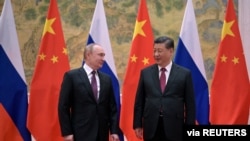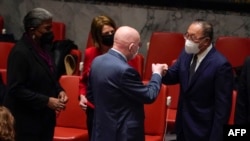Russia’s decision to send troops into two separatist enclaves in eastern Ukraine is forcing a difficult choice for China, which has aligned itself closer with Moscow but could face blowback if it is seen as supporting the unilateral redrawing of international borders, analysts say.
The government of Russian President Vladimir Putin on Monday formally recognized the self-declared Donetsk and Luhansk People’s Republics and ordered what it called “peacekeepers” into the contested regions. The moves followed a fiery speech in which Putin questioned Ukraine’s very statehood, further raising concern he is planning a large-scale invasion.
The situation is tricky for Chinese leader Xi Jinping, who earlier this month declared a “no limits” partnership with Russia following a meeting with Putin. The meeting was the latest evidence Russia and China have drawn closer as both attempt to counter U.S. global influence.
But the Ukraine issue is already testing how far that enhanced partnership can go. Analysts say China is likely concerned about foreign turmoil that could impact its economy, especially during a sensitive year of domestic political maneuvering meant to shape what is expected to be Xi’s indefinite rule.
China, which has long insisted it opposes interference in other countries’ internal affairs, may also be worried about its international reputation taking a hit.
On Saturday, Chinese Foreign Minister Wang Yi told the Munich Security Conference that the sovereignty of all nations should be respected. “Ukraine is no exception,” he added.
In recent weeks, China has called for restraint on all sides in Ukraine, as well as a return to the Minsk Agreements, which were meant to restore peace following a flare-up of violence along the Russia-Ukraine border in 2014.
But by recognizing the two disputed Ukrainian territories, Putin “obliterated” the Minsk Agreements, in the process essentially destroying a key Chinese talking point, says Derek Grossman, a senior analyst who focuses on Asia at the RAND Corporation, a California-based global policy research organization. “All of that is completely out the window if Russia does invade,” Grossman told VOA.
Speaking late Monday at an emergency meeting on Ukraine at the United Nations Security Council, China’s U.N. envoy Zhang Jun issued only brief remarks, calling for all sides to “exercise restraint.” He did not mention the Minsk Agreements.
The speech “reads like a placeholder,” said Bonnie Glaser, director of the Asia Program at the German Marshall Fund of the United States. “China hasn’t decided what its policy response should be yet,” she concluded.
In some ways, the situation mirrors that of 2014, when Russia seized the Crimea peninsula from Ukraine. At the time, China also responded by insisting that Ukraine’s territorial sovereignty should be respected but that the West should consider Russia’s “legitimate security concerns.”
Since then, however, geopolitics has shifted. Not only have U.S.-China ties worsened, China has gotten stronger economically and militarily and is now bolder about challenging U.S. power.
But Ryan Hass, a China scholar at the U.S.-based Brookings Institution, cautioned against assuming China has already chosen to support Russia on the Ukraine issue.
“If there is war in Ukraine, and if China actively attempts to shield Russia from global condemnation, then China may spur a self-harming solidification of blocs” in which China is aligned with “the weakest other major power,” he tweeted.
China may also be reluctant to damage its diplomatic and economic relationship with Europe, which is strongly opposed to a Russian invasion of Ukraine.
“Beijing needs to be helped toward realizing that going all-in on the China-Russia relationship carries more risks than benefits,” Hass said.
Other analysts are more pessimistic. Russia and China may be determined to form a relationship that can overturn large swaths of U.S. dominance, argued Robert Kagan, senior fellow at the Brookings Institution, in an editorial in The Washington Post.
“It is really their shared desire to disrupt the international order that creates a common interest,” he said.






